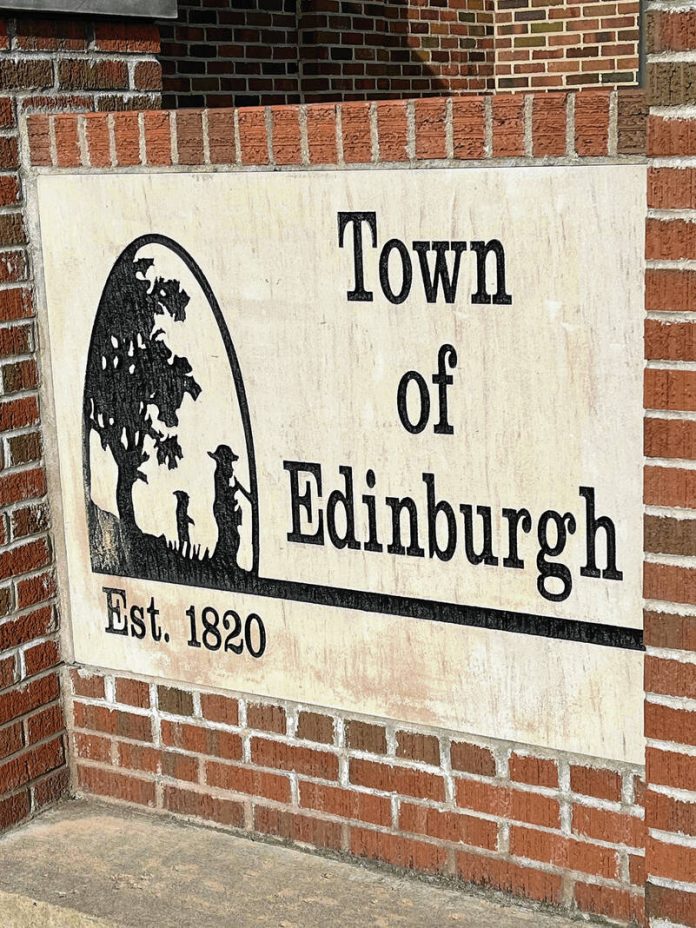Edinburgh’s budget has increased by almost $1 million, following a new income tax in Johnson County and rising home values.
The advertised budget, which the Edinburgh Town Council approved unanimously on Sept. 25, includes $8.7 million for town officials to work with in 2024. The budget won’t be official until the Indiana Department of Local Government Finance certifies it later this year. This year’s budget was $7.8 million, according to information from Indiana Gateway, a budget reporting database.
Most of the budget — almost $5 million — is reserved for the general fund. That fund includes salaries and benefits, repairs and maintenance, and supply purchases for the police department, fire department, town government and town hall, solid waste, cemetery and aquatics center. The motor vehicle highway fund, which funds road repairs and maintenance, is the second largest fund at $1.2 million, while parks and recreation rounds out the top three with a budget of $932,150, according to Gateway.
Budget increase
The new income tax, which was levied by the Johnson County Council, accounts for more than half of the town’s nearly $1 million year-to-year budget increase.
In August 2022, the Johnson County Council approved a 0.2% Economic Development Income Tax, or an EDIT. The tax generates money for the county government and Johnson County cities and towns, and will appear on Edinburgh’s budget for the first time next year, with $500,000 budgeted. With money accumulated this year from the fund, town officials will pull in about $774,000 over the course of 2023 and 2024, but they want to have some dollars left over, said Scott Finley, the town’s clerk-treasurer.
The money can be used in place of the cumulative bridge fund, typically used to cover bridge and culvert repairs, which the Johnson County Board of Commissioners and Johnson County Council voted to dissolve in December. Town leaders haven’t yet decided what to do with the funds next year, and will have to create and submit an EDIT report to the county detailing those plans beforehand, Finley said.

Edinburgh also gets an annual EDIT fund from Bartholomew County and Shelby County, although the amounts are much smaller, as there are fewer people who live in those parts of town. Next year, the town will get $65,000 from Shelby County’s EDIT and another $65,000 from Bartholomew County. Money from those counties is used for projects in those respective parts of Edinburgh, he said.
“We use it to offset the parks department in Bartholomew County and we use it to offset the golf course at the shelter, because we just try and keep the funds where they come from,” Finley said. “The golf course is in Shelby County and the parks department is primarily in Bartholomew County, so that’s being offset. They’re both economic development-related. The parks obviously assist with economic development and the golf course is also big for economic development.”
The other major factor in the budget increase is rising home values, which generate more property taxes the town can use for various funds. Despite the population remaining mostly stagnant from year to year with between 4,400 and 4,500 residents, the town will pull in $4.6 million in property taxes, compared to $4.3 million last year, Finley said.
Increases in assessed value have allowed the town to pull in more money despite the property tax rate actually decreasing. This year, the property tax rate was $2.24 for every $100 of assessed value. Once the DLGF approves the budget, it will likely decrease slightly to between $2.22 and $2.23 for every $100 in 2024, Finley said.
New items, salary increases
Town employees will get pay increases of 3% to 5%, Finley said.
Along with salaries and benefits for town employees, the largest new expenditures will be the $550,000 in street repair work, $424,000 in expenses related to garbage pickup and disposal, and two new Dodge Durango police SUVs, which cost about $60,000 each including lights and equipment, he said.
“For 2024 we don’t have a whole lot of capital projects,” Finley said. “We budgeted for two new police vehicles, some replacement equipment at the golf course. We’re looking at some radios for the police department, some new ballistic vests and some equipment for the fire department. They’re looking to replace their self-contained breathing apparatus and (get) some more hose.”
Overbudgeting, not overspending
Edinburgh has about $5.4 million in its cash balance, which helps protect the town if there are any unexpected spending needs. This year, however, the town has overbudgeted by $869,000, meaning if town officials were to spend every budgeted dollar, that cash balance would decrease to about $4.5 million. If that trend continued for another five years, that cash balance would be depleted, Finley said.
“Ultimately, if we continue to budget at a deficit, it will eat into our cash balance and will slowly dwindle the cash in our reserves,” he said. “In the long term, we either need to bring in more revenue from property taxes or other avenues or decrease our spending.”
Overbudgeting isn’t new for Edinburgh, but it hasn’t caused any issues yet because the town isn’t fully staffed. The full budget assumes full staffing in all departments, Finley said.
“Historically, the town of Edinburgh has not spent its entire budget. Wages have been lower because we’re short people. Specifically, it’s the fire department. Our fire department has a set staffing plan we’ve not been able to hit,” he said. “We can’t get people and we’re short-staffed, and that’s all departments. We’ve just been short-staffed so there’s been some excess wages at the end of the year.”
One way to avoid overspending once departments are fully staffed is to bring in more development, as a larger population will bring in more tax dollars without having to raise tax rates, Finley said.
“Ideally, we’ll increase our revenue, but in order to do that we need increased assessed value through housing and commercial developments,” he said. “With a comprehensive plan, we can get those in place and it will help outline our vision for the future and how we want development to be. More development means less tax burden will be on each resident.”
BY THE NUMBERS
2023 budget vs 2024 budget
General Fund
2023: $4,710,773
2024: $4,990,875
Casino/Riverboat Fund
2023: $100,000
2024: $150,000
Local Road & Street Fund
2023: $150,000
2024: $200,000
Motor Vehicle Highway Fund
2023: $1,207,700
2024: $1,180,270
Park & Recreation Fund
2023: $945,750
2024: $932,150
Cumulative Capital Improvements (Cigarette tax) Fund
2023: $30,000
2024: $25,000
Cumulative Capital Development Fund
2023: $60,000
2024: $100,000
Shelby County EDIT Fund
2023: $50,000
2024: $65,000
Bartholomew County EDIT Fund
2023: $46,500
2024: $66,500
Johnson County EDIT Fund
2023: Not listed
2024: $500,000
Parks & Recreation Non-Reverting Operating Fund
2023: $360,250
2024: $374,830
Public Safety Fund/Capital Outlays
2023: $150,000
2024: $150,000
Total
2023: $7,810,973
2024: $8,734,625
Source: Indiana Gateway





